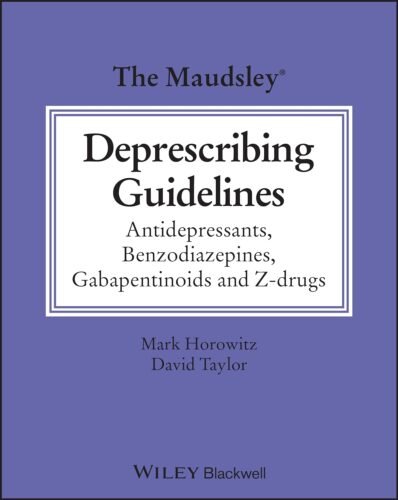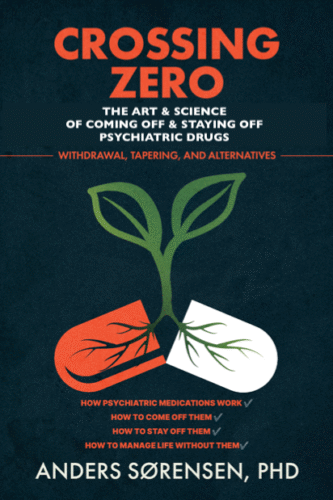How consultant pharmacist Dr. DeLon Canterbury
helps patients safely go off psychotropic drugs
Wednesday, September 10, 2025
10-11 am PST | 1-2 pm EST | 5-6 pm GMT
Register today! Registration closes noon PST September 8, 2025
Patients who want medically informed guidance in going off prescribed psychotropics often cannot find clinicians with that expertise. In this webinar, DeLon Canterbury, PharmD, BCGP, a pharmacist who has created a private deprescribing practice, will discuss:

- Becoming a pharmacist offering consultation to patients and physicians about deprescribing
- Helping patients design a taper schedule
- Communicating with the treating physician (and how this advice is received)
- Handling customized doses and orders for compounding
- The success of his approach
- Case study: Deprescribing benzodiazepine for an 80-year-old woman
A short question-and-answer period will follow the presentation. Note that the speaker cannot advise on individual treatment.
Reserve your place here. Donations are requested to support our webinar series. Registration closes noon PST September 8, 2025. A video of the webinar will be available for those who register but find they cannot attend.
Consulting with the treating physician on individualized tapers
DeLon will explore the technical aspects of customized dosing and the art of creating individualized taper schedules. His methodology for designing these schedules represents years of fostering collaborative relationships with physicians while advocating for patient-centered tapering and individualized dosages.
This addresses a critical gap in protocols for deprescribing psychotropics: a customized prescription must be issued by a clinician licensed to write prescriptions. His insights into navigating the professional dynamics of being a deprescribing consultant will be especially valuable for pharmacists seeking to expand their scope of practice.
He will present a case study of benzodiazepine deprescribing in an 80-year-old woman that illustrates the complexities involved in psychotropic deprescribing. This population presents unique challenges due to age-related pharmacokinetic changes, polypharmacy concerns, and increased vulnerability to withdrawal effects.
An inappropriate antipsychotic endangered his grandmother
DeLon has personal experience in addressing inappropriate psychotropic drug treatment in the elderly. He initially intended to dedicate his career to serving low-income and rural populations throughout North Carolina as a community pharmacist. But a devastating experience with his grandmother, Mildred, redirected his professional focus from traditional community pharmacy to trailblazing.
While he was attending the University of North Carolina Eshelman School of Pharmacy, DeLon’s grandmother Mildred, who had mild dementia, was in an assisted-living facility. For months, the family watched helplessly as Mildred’s cognitive decline accelerated, manifesting in increased wandering, hiding of valuables, and severe memory loss. As it turned out, she had been inappropriately prescribed a sedating antipsychotic. During a medication refill, the community pharmacist pointed out the Black Box warning associated with antipsychotics for dementia patients. The pharmacist “advocated for our family by calling the doctor and having the medicine deprescribed over a few weeks, where Mildred returned to her baseline self,” DeLon has written. “She died my last day of pharmacy school, but lived to see 90 years old because of this pharmacist.”
That was in 2014. This preventable medical error that endangered his grandmother set DeLon on an unusual path: to becoming the “Deprescribing Pharmacist” with a private practice.
A private practice in deprescribing for patients
To provide expert deprescribing consultation for patients, caregivers, and healthcare teams, in 2019 DeLon founded a concierge deprescribing telehealth service, GeriatRx. GeriatRx’s first patient was a 70-year-old woman taking 36 prescriptions involving numerous prescribing cascades, polypharmacy, and duplicate therapies. Due to severe memory loss and oversedation, she had been described as a “walking zombie” by her caregiving daughter.


Working collaboratively with her primary care physician, DeLon strategically tapered her medications down to only 3 medications over time. She was able to remain at home rather than require costly memory care placement, saving the family the substantial cost of a nursing home while allowing the patient to age gracefully in place.
An active member of the US Deprescribing Research Network (USDeN), DeLon recently received a mini-grant in partnership with Duke CERI and AME Zion HEAL for groundbreaking research focused on African-American communities. His current pilot study is the first African-American focused deprescribing initiative using faith-based communities and precision medicine.
Make your reservation before noon PST September 8. If you cannot attend, a video of the webinar will be available later for those on our registration list.



